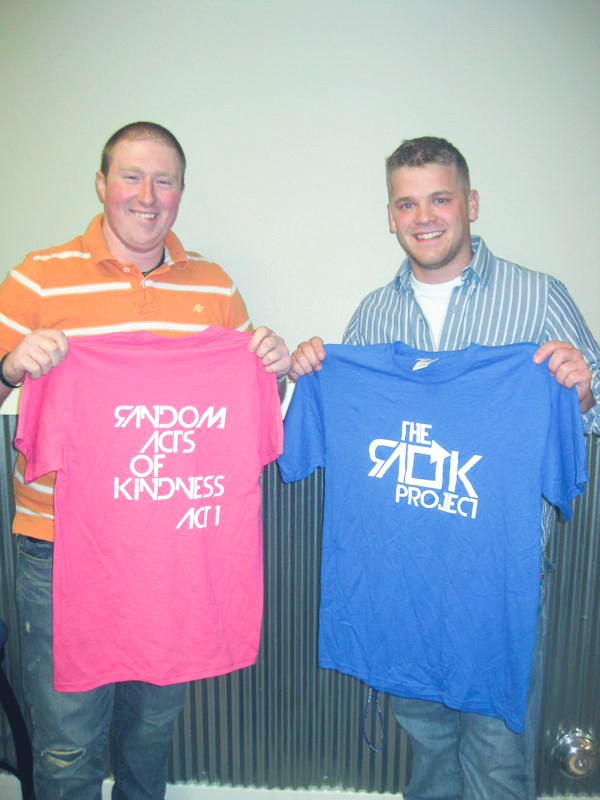Kindness project to donate t-shirts to children’s hospital

Courtesy Photo / Kyle Fetner Junior Brock Hyder and Senior Kyle Fetner showcase the random acts of kindness shirts
Apr 11, 2011
Their pink and blue shirts advertise the feeling of happiness gained by performing random acts of kindness in hopes of inspiring others to do the same. In fact, that is how their company got to be called the Random Acts of Kindness (RAOK) Project.
Together, two Grand Valley State University students, senior Kyle Fetner and junior Brock Hyder, are in the process of expanding their business and have recently succeeded in doing so. Earlier this month, Fetner and Hyder received permission to donate to Helen DeVos Children’s Hospital. Each time a blue or pink RAOK shirt is purchased, another one will be donated to the hospital.
“We say a child in need is what we’d like to focus on, but it’s really the idea of a random act of kindness,” Fetner said. “For example, kids who have been in tragic accidents might not have clothes to wear back home from the hospital. By doing this, we are trying to show that the older generation cares about the younger generation. It’s kind of like trying to close the gap that’s between us.”
After hearing the project’s proposal, Helen DeVos Children’s Hospital decided to team up with the RAOK Project. The hospital took an interest in the mission of supporting the community and giving back to the young people of West Michigan.
“RAOK provides our health care providers an opportunity to share a great message with kids,” said Jen Adams, development coordinator at the Helen DeVos Children’s Hospital Foundation. “The Grand Valley State University students are good role models for our patients. The leaders of tomorrow are sharing a message that kindness can go a long way.”
Fetner and Hyder hope to eventually to hold a large event to sell shirts that would ultimately be given to kids in the hospital who may need them.
“Having an event is still a little up in the air because we are still in that trying-to-start stage,” Fetner said. “But it would be great because people would be buying a shirt for a great cause, and when you do something nice for someone, it feels good.”
About 50 shirts have been sold since the project launched in January. Shirts can be purchased locally for $20 by contacting Fetner at [email protected]. Otherwise, they are sold online for $25 at www.raokproject.org.
“When you buy something, you advertise for the company you bought from,” Hyder said. “With the RAOK Project shirt, it reminds you that you should do something good. I want people to ask questions about the shirts and wonder about its purpose. I want the shirts to make people want to get involved. I’d like to see it expand to other colleges too.”





















